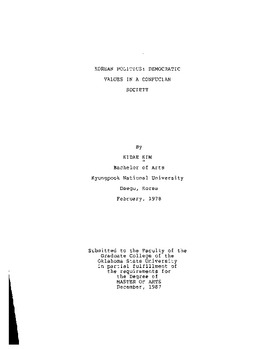| dc.contributor.advisor | Darcy, Robert | |
| dc.contributor.author | Kim, Kidae | |
| dc.date.accessioned | 2015-08-28T15:49:36Z | |
| dc.date.available | 2015-08-28T15:49:36Z | |
| dc.date.issued | 1987-12-01 | |
| dc.identifier.uri | https://hdl.handle.net/11244/17008 | |
| dc.description.abstract | Democratic political development in developing countries has been a concern to political scientists in developing countries and developed countries since the 1960s. Now we understand that political development cannot be obtained by the institutions of the political system alone. To achieve democracy, a society needs to formulate a democratic environment and political culture in which the democratic institutions can operate. Conflicts between traditional and democratic values in a transforming society can hinder the operation of modern democracy, especially when the traditional values are strongly rooted. Korean society is the case in point. The strong Confucian ethos of the society has been one of the important factors hindering democratic development. Three dimensions of the political system were studied to understand the problem; cultural background, origin of political support, and the performance of the election system. | |
| dc.format | application/pdf | |
| dc.language | en_US | |
| dc.publisher | Oklahoma State University | |
| dc.rights | Copyright is held by the author who has granted the Oklahoma State University Library the non-exclusive right to share this material in its institutional repository. Contact Digital Library Services at lib-dls@okstate.edu or 405-744-9161 for the permission policy on the use, reproduction or distribution of this material. | |
| dc.title | Korean Politics: Democratic Values in a Confucian Society | |
| dc.type | text | |
| osu.filename | Thesis-1987-K493k.pdf | |
| osu.accesstype | Open Access | |
| dc.description.department | Political Science | |
| dc.type.genre | Thesis | |
